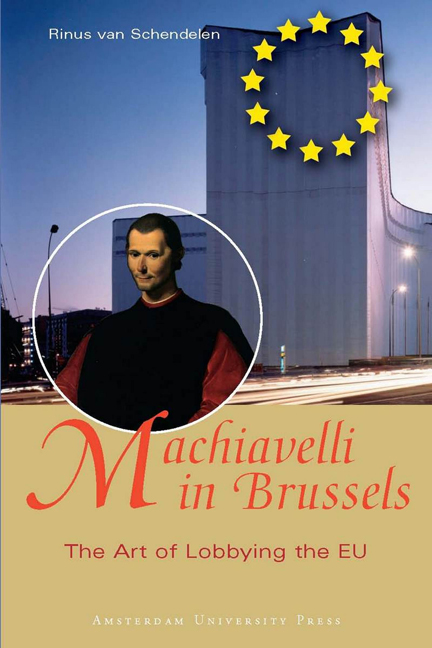Book contents
- Frontmatter
- Contents
- Detailed contents
- Preface
- List of Figures
- List of Abbrevatiations
- 1 The Europeanisation of Public Affairs
- 2 The Playing Field: EU Common Decision-Making
- 3 Pushing the Buttons of ‘Brussels’
- 4 Managing the EU Arena
- 5 Managing the Home Front
- 6 Managing the Fieldwork
- 7 The Limits of EU Public Affairs Management
- 8 Lobbying and EU Democracy
- References
- Index
- Frontmatter
- Contents
- Detailed contents
- Preface
- List of Figures
- List of Abbrevatiations
- 1 The Europeanisation of Public Affairs
- 2 The Playing Field: EU Common Decision-Making
- 3 Pushing the Buttons of ‘Brussels’
- 4 Managing the EU Arena
- 5 Managing the Home Front
- 6 Managing the Fieldwork
- 7 The Limits of EU Public Affairs Management
- 8 Lobbying and EU Democracy
- References
- Index
Summary
Is it possible to influence the European Union (EU) and to achieve a desired outcome? Thousands of lobby groups based in Brussels or operating from their home country, do at least believe so, as they sniff around hoping to acquire some of the EU honey and money. They range from companies and trade associations through non-governmental organisations like trade unions and environmental groups, to so-called public interest groups like national ministries, local governments and public agencies. They come not only from all levels within the member countries, but also from others such as the USA, Japan and those in the Third World. Even people and units of the European Commission, Parliament and Council frequently act as lobby groups themselves. Like birds and bees, smelling the scents of the flowers of ‘Brussels’, they try to get closer in order to achieve a desired legislative, financial or other outcome.
This book is not just about the EU, but it regards this political system primarily as a most relevant machinery of decision-making within which to examine the art of lobbying. The EU produces its outputs largely under the competitive pressures from all sorts of lobby groups. Our focus is on the questions of how these groups try to score and how they can improve their scores. The answers come from two scientific disciplines. Firstly, political science, the mother of the study of influence, with lobbying as the special case of exerting influence in unorthodox ways. We examine the use of such influence within the EU. Its machinery is described and analysed in ‘flesh and blood’ terms. Lobby groups want to know how it really works and not how it is supposed to work. They want to win, or at least not to lose. The second discipline is management science, which regards the study of ‘how to get things done as desired’ or how to achieve success in management. Lobby groups want to score and to improve their scores. They want to know the best practices. Niccolò Machiavelli is a model for both sciences. He was the early modern scientist in this field, and was focused on the two questions of how influence is really exerted and how it can be made more effective.
- Type
- Chapter
- Information
- Machiavelli in BrusselsThe Art of Lobbying the EU, pp. 11 - 14Publisher: Amsterdam University PressPrint publication year: 2004



